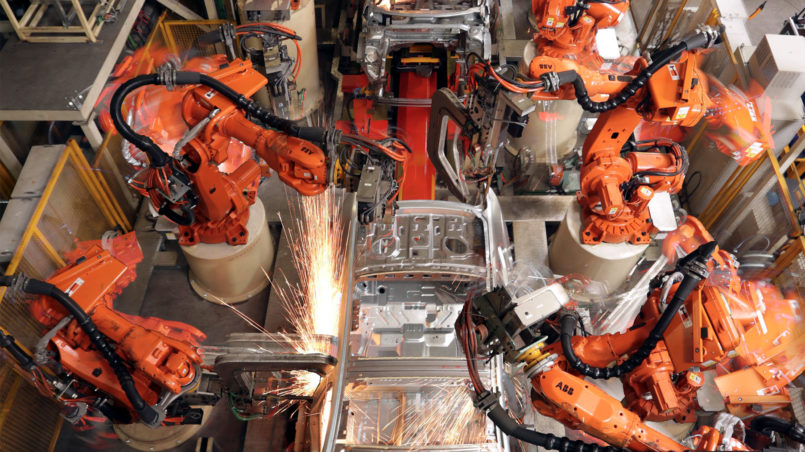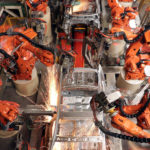Machine tax: is rationalization evil?

Robots, automation and rationalization are once more the topic of discussion. One of the first demands of Chancellor Kern for a “machine tax” is reminiscent of the widespread view, that each machine automatically takes away people’s jobs. Moreover, the current, still difficult to predict development of networking of production is – marketing fit and pompously – referred to as “Industry 4.0”, a supposedly new industrial revolution, which causes old fears to flare up in the population, still sitting in their heads from the true, the first industrial revolution.
These fears, Josef Urschitz expresses in several “Die Presse” commentaries. If we are to believe his fears, in the future onlx robots instead of people will do all work, and people simply no longer have jobs, sitting around instead. However, if we look at history: Didn’t we have these fears in the 19th century, as well? Why are there still relatively many jobs?
Let’s look at the highs and lows of automation and rationalization:
The Bright Side: higher living standards for all
Jobs are not a finite ressource. They come and go, depending on the ability of a society to create added value and to circulate these values through consumption, de facto distributing them to other professionals through purchase and service. The most dangerous thing for the labor market is, if a society does not create more added value, in other words if it no longer produces.
An automated production creates jobs as well as taking them. While machines replace manual labor, they simultaneously create better paying jobs in engineering, sales, and in the maintenance, but also in the company supplying and manitaining the machines. There, the extra volume in production is to be planned and controlled by many highly qualified people, as well, of course, as the quantities of products to sell and deliver. In total, an automated production, depending on the situation, can even create more jobs.
The benefits of machine production for society is huge. Who among us is still really gratefu lat Thanksgiving that we have enough food for the winter, instead of starving? Two hundred years ago, people were afraid for the harvest in bad years. Today, thanks to its machines (and of course the fertilizer), agriculture harvest-securely works areas which could not possibly feed the present population in the old fashioned manner, and foods are far more affordable than in the past, yes, thanks to the machine! The same is true for textiles, automobiles etc. The entire increase of our standard of living is based on machine production.
The downside: Uneducated stay on track
Already at the beginning of the 19th century Luddites angryly destroyed the emerging textile machinery. But who were these people? They were performing arduous textile work by hand and built a meager existence from that. This broke away suddenly because of the machines. These people had no future.
What is still true in sum: machines create jobs, rather than destroying them. But the catch is:
An automated production needs highly educated people, not unskilled workers.
The solution: education, education, education
If only we could pursue the two paths combinedly: England in the 19th century and Cuba in the late 20th century. While through its industrial revolution, England added value galore on the production side, its proletariat is depleted because its educational level could not follow the rapid development.
Castro’s Cuba is the negative counter-example: The standard of education is exemplary, but the Communist-led industry was unable to provide adequate jobs for its well-educated population at any point.
For the policy I therefore see a clear task: a state needs highly efficient, producing industries and trades. It can build service industries around this, but the added value of production is the indispensable basis. Automation is a good tool to increase our standard of living.
But a state fails when it does not simultaneously with the increase in productivity, comprehensively raise the education level of its population.
We need not only more but also better education. Even if no one has so far used the slogan educational efficiency, it is high time for it. The level of schools and universities must be systematically raised because educational time merely served and pointless memorization reduce quality. Lifelong learning, better, shorter but more efficient education in schools and more in-service training instead, are more true to the dynamics of our time.
The message to Chancellor Kern remains, in my view: Instead of punishing machine production, the focus on a sustained improvement of our education system is the better response to the increasing automation of production in Austria.
Notes: “The press” comment by Josef Urschitz: When robots take over the work
http://diepresse.com/home/wirtschaft/economist/diebilanz/5067547/Wenn-Roboter-die-Arbeit-ubernehmen
Translation from German: Serena Nebo
Credits
| Image | Title | Author | License |
|---|---|---|---|
 |
FlexLean Production Line | Zen wave | CC BY-SA 4.0 |
